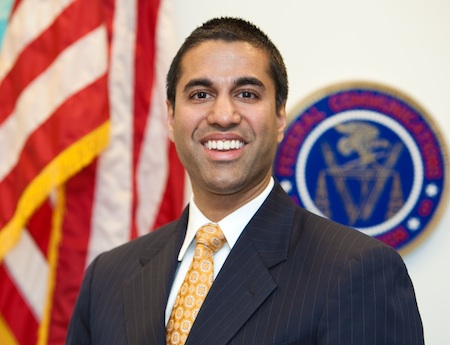FCC's Pai: We Shouldn't Be in Sports Blackout Business

The smarter way to stay on top of broadcasting and cable industry. Sign up below
You are now subscribed
Your newsletter sign-up was successful
FCC commissioner Ajit Pai told a Buffalo, N.Y., audience that it is time to repeal the sports blackout rule.
That is the FCC rule that prevents cable and satellite operators from showing a game if it is blacked out on the local TV station due to a lack of stadium ticket sales.
Pai, who joined Buffalo Rep. Brian Higgins (D-N.Y.) for the event at the Anchor Bar (home of Buffalo wings), said that after reviewing all the arguments, "I don’t believe the government should intervene in the marketplace and help sports leagues enforce their blackout policies. Our job is to serve the public interest, not the private interests of team owners."
It may have been at the Anchor Bar, but Pai was preaching to the choir since Buffalo has had nine games blacked out over the past four seasons, or about a quarter of all its home games.
Pai has already voted to eliminate the blackout rule, but that was back in late 2013. He billed his speech as announcing his position on the rule, and called for an up-or-down vote by the end of the year. The vote on the proposal was unanimous, but the NFL and broadcasters have been pushing back hard on lifting the rule.
That includes launching a Web site and sending former Pittsburgh Steelers great Lynn Swann to lobby against lifting the ban.
Just two weeks ago, the NFL and NFL Players Association (the players' union) sent execs to the FCC to try to persuade advisors to FCC chairman Tom Wheeler that the rule was key to keeping the NFL's games on broadcast TV. They warned, as they have before, that getting rid of the rule puts the local broadcast model at risk because it "may cause sports leagues to move sports programming from free over-the-air broadcast TV to pay TV," as the mayor of Indianapolis, Gregory Ballard, said in a letter submitted by the NFL execs to the FCC.
The smarter way to stay on top of broadcasting and cable industry. Sign up below
Pai said the rule is unnecessary and an example of handing out special favors. "There is no reason [for the FCC] to be in the sports blackout business," he said.
The FCC rule is only a backstop, so the NFL can still impose blackouts contractually, a point Pai conceded. "I realize that eliminating the rule is no silver bullet. Even without the FCC’s blessing, there could still be dark screens any given Sunday," he said. "So I can’t promise Buffalo residents that they’ll be able to watch all Bills games on television if we get rid of the rule. But that’s no excuse for keeping it on the books."
Contributing editor John Eggerton has been an editor and/or writer on media regulation, legislation and policy for over four decades, including covering the FCC, FTC, Congress, the major media trade associations, and the federal courts. In addition to Multichannel News and Broadcasting + Cable, his work has appeared in Radio World, TV Technology, TV Fax, This Week in Consumer Electronics, Variety and the Encyclopedia Britannica.

